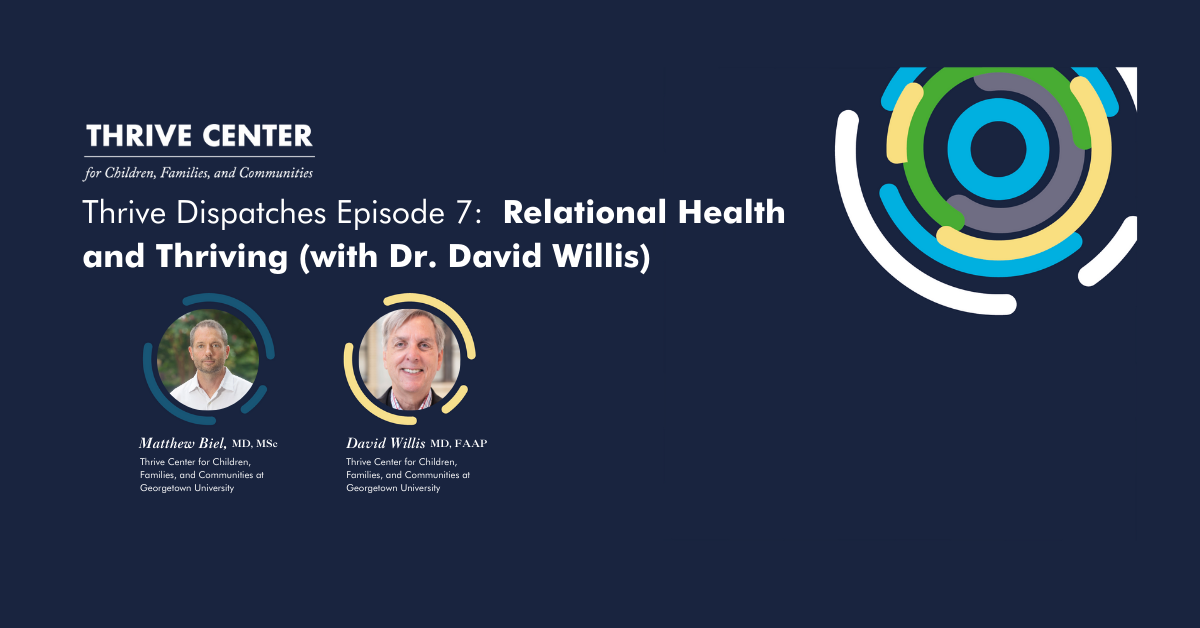Welcome to Episode 7 of Thrive Dispatches. This week, Dr. Matt Biel speaks with Dr. David Willis, a pediatrician who dedicated his career to understanding how relationships shape child development and wellbeing and putting in places policies and support structures to enable these relationships to flourish.
David brings a unique perspective shaped by his experiences as a developmental and behavioral pediatrician, academic scholar, leader of federal policy in early childhood, and founder of the Nurture Connection Network.
The discussion explores the evolution of pediatric care beyond individual treatment toward a more holistic understanding of children within their relational ecosystems—families, neighborhoods, schools, and communities.
David shares evidence and case studies on how communities across the country are successfully implementing locally-tailored relational health initiatives that honor families’ values while addressing isolation and fostering connection – as well as the results these programs deliver including Bridgeport, Connecticut’s “Baby Bundle” initiative that has improved developmental outcomes in Head Start by 15% in just four years.
For questions, comments, or ideas for future episodes, please email us at: thrivecenter@georgetown.edu
Summary:
In the following excerpt, Matt and Robert discuss the origins of the Nurture Connection Network, a movement—and the implementation arm of the early relational health framework—dedicated to ensuring that every child, family, and community has the positive, nurturing relationships they need to thrive.
Matt: Take me now from those insights to your work building the Nurture Connection Network—how has it expanded outward and become community-led?
David: When I joined HRSA to run the Home Visiting program under Obama, I carried the relational health frame into policy. Then at the Perigee Fund and the Center for the Study of Social Policy, I tested relational health as a transformational agent across health, early care and education, public health—and most importantly, communities.
At CSSP, a parent leader, Charlyn Harper Browne, challenged me: “Another way families can fail?” That sharpened our focus on co-development with families, listening and learning from them. They reminded us that people don’t raise kids through the health system—they raise them through relationships. Thus Nurture Connection was born: a network built on principles of shared mission (thriving), no single star, and collective trust.
Today the Nurture Connection Network brings together cross-sector leaders—pediatricians through Reach Out and Read, home visitors, infant mental health specialists, parent leaders, and community coalitions—to advance relational health locally, data-driven, in ways tailored to each community’s priorities. In Bridgeport, Connecticut, a collective impact model called the Baby Bundle has mobilized healthcare, public health, churches, neighborhoods, grandmothers, and families. In just four years, they’ve boosted developmental milestones in Head Start by 15%. Similar networks are growing in Michigan, Oklahoma, rural Oregon, and beyond—each shaped by families’ values and local contexts, yet united by the relational health frame.
Matt: Each community does it by its own lights, reflecting what their families want to work on.
David: Exactly. Nurture Connection is a learning journey—a co-developed, data-driven movement helping families move from isolation to connection, so children flourish in supportive relationships.
Listen to the full episode
- Tagged
- adversity
- child development
- child flourishing
- community collaboration
- community-led initiatives
- Dr. David Willis
- early brain development
- early childhood
- family wellbeing
- family-centered care
- georgetown university
- mental health
- Nurture Connection Network
- parent partnerships
- pediatric care
- pediatrics
- preventive healthcare
- relational health
- relationships as vital signs
- resilience
- social determinants of health
- social emotional development
- Thrive Center
- thriving communities
- trauma-informed care
